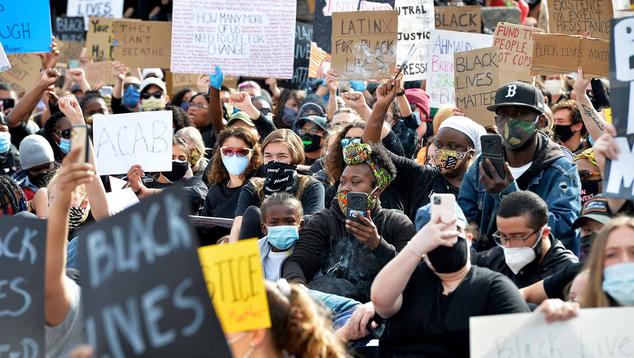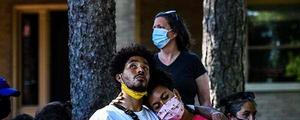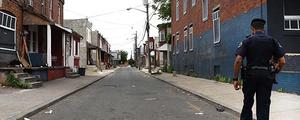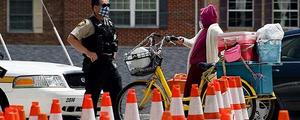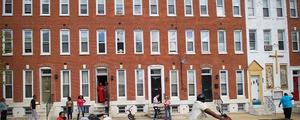Story Highlights
- Large increase in percentage saying economic boycotts can help racial cause
- While higher than in the past, relatively few see violent protest as helpful
- Black adults twice as likely as in 1988 to say violent protest can help
WASHINGTON, D.C. -- U.S. adults are more likely today than three decades ago to view several forms of protest as potentially helpful for improving the situation of Black Americans. Since Gallup last polled on this subject in 1988, there have been meaningful increases in the percentages of Americans saying that nonviolent protest, violent protest and economic boycotts, in particular, can help. Opinions on the effectiveness of legal action are little changed.
Americans are still most likely to see nonviolent protest and legal action as being helpful, and least likely to say violent protest is.

Stacked bar graph. 77% of Americans up from 68% in 1988 say nonviolent protest can help improve the situation of Black Americans. 66% similar to 62% in 1988 say legal action can help improve the situation of Black Americans. 50% up from 29% in 1988 say economic actions such as boycotts can help improve the situation of Black Americans. 12% up from 4% in 1988 say violent protest can help improve the situation of Black Americans. 73% of Americans down from 79% in 1988 say violent protest hurts efforts to improve the situation of Black Americans.
These results are based on a June 8-July 24 survey of U.S. adults, which included an oversample of Black Americans.
The survey was conducted during a period of nationwide protests for racial justice and police reform in response to the May 25 death of George Floyd while in Minneapolis police custody.
Most of the recent protesting has been peaceful, which is in keeping with U.S. adults' views that nonviolent protest is helpful for improving the situation of Black Americans. Some protests have resulted in property damage, injury and even death. While slightly more Americans today than in 1988 view violent protest as potentially helpful, the majority, 73%, still view it as harmful.
Whereas Americans in 1988 were split on the effectiveness of economic action such as boycotts, they are now much more inclined to say it would help (50%) rather than hurt (22%) Black Americans' situation. Many companies publicly affirmed their support of the Black community after Floyd's death, but advocates for the Black Lives Matter movement called for boycotts of companies that do not support BLM efforts.
A recent example of the potential impact of economic action that occurred during the poll's field period was the decision of the Washington, D.C., football team to drop its "Redskins" nickname after years of controversy. The decision came after major corporate sponsors demanded a name change and threatened to sever ties with the team if it did not comply.
Views Toward Boycotts, Violent Protest Differ by Racial Group
Black adults tend to be more optimistic than White adults that the various citizen actions tested in the poll would help improve the situation for Black Americans.
The two racial groups differ most in their opinions about the effectiveness of boycotts -- 69% of Black adults and 48% of White adults say boycotts would help. But White respondents are twice as likely to say boycotts are helpful rather than harmful.
Black Americans are modestly more likely than White Americans to believe legal action (74% vs. 65%, respectively) and violent protest (21% vs. 9%) can help. But majorities of both groups view violent protest as hurting the cause.
A nonsignificant six percentage points separate Black (72%) and White (78%) Americans' views of the helpfulness of nonviolent protest.
| Help | Hurt | No effect | ||||||||||||||||||||||||||||||||||||||||||||||||||||||||||||||||||||||||||||||||||||||||||||||||||
|---|---|---|---|---|---|---|---|---|---|---|---|---|---|---|---|---|---|---|---|---|---|---|---|---|---|---|---|---|---|---|---|---|---|---|---|---|---|---|---|---|---|---|---|---|---|---|---|---|---|---|---|---|---|---|---|---|---|---|---|---|---|---|---|---|---|---|---|---|---|---|---|---|---|---|---|---|---|---|---|---|---|---|---|---|---|---|---|---|---|---|---|---|---|---|---|---|---|---|---|---|
| % | % | % | ||||||||||||||||||||||||||||||||||||||||||||||||||||||||||||||||||||||||||||||||||||||||||||||||||
| Nonviolent protest | ||||||||||||||||||||||||||||||||||||||||||||||||||||||||||||||||||||||||||||||||||||||||||||||||||||
| Black adults | 72 | 7 | 20 | |||||||||||||||||||||||||||||||||||||||||||||||||||||||||||||||||||||||||||||||||||||||||||||||||
| White adults | 78 | 5 | 16 | |||||||||||||||||||||||||||||||||||||||||||||||||||||||||||||||||||||||||||||||||||||||||||||||||
| Legal action | ||||||||||||||||||||||||||||||||||||||||||||||||||||||||||||||||||||||||||||||||||||||||||||||||||||
| Black adults | 74 | 5 | 19 | |||||||||||||||||||||||||||||||||||||||||||||||||||||||||||||||||||||||||||||||||||||||||||||||||
| White adults | 65 | 12 | 21 | |||||||||||||||||||||||||||||||||||||||||||||||||||||||||||||||||||||||||||||||||||||||||||||||||
| Economic action such as boycotts | ||||||||||||||||||||||||||||||||||||||||||||||||||||||||||||||||||||||||||||||||||||||||||||||||||||
| Black adults | 69 | 11 | 19 | |||||||||||||||||||||||||||||||||||||||||||||||||||||||||||||||||||||||||||||||||||||||||||||||||
| White adults | 48 | 24 | 27 | |||||||||||||||||||||||||||||||||||||||||||||||||||||||||||||||||||||||||||||||||||||||||||||||||
| Violent protest | ||||||||||||||||||||||||||||||||||||||||||||||||||||||||||||||||||||||||||||||||||||||||||||||||||||
| Black adults | 21 | 59 | 19 | |||||||||||||||||||||||||||||||||||||||||||||||||||||||||||||||||||||||||||||||||||||||||||||||||
| White adults | 9 | 79 | 12 | |||||||||||||||||||||||||||||||||||||||||||||||||||||||||||||||||||||||||||||||||||||||||||||||||
| Gallup, June 8-July 24, 2020 | ||||||||||||||||||||||||||||||||||||||||||||||||||||||||||||||||||||||||||||||||||||||||||||||||||||
Since 1988, Black adults have become more likely to view boycotts (up 15 points, from 54%) and violent protest (up 11 points, from 10%) as potentially helpful. Their views on nonviolent protest and legal action are similar to what they were 32 years ago.
White Americans' opinions on the helpfulness of legal action and violent protest have changed little since 1988, but they are significantly more likely now to think nonviolent protest and especially boycotts are effective. The percentage of White adults who say boycotts are helpful has nearly doubled, from 26% to 48%.
| 1988 | 2020 | Change | ||||||||||||||||||||||||||||||||||||||||||||||||||||||||||||||||||||||||||||||||||||||||||||||||||
|---|---|---|---|---|---|---|---|---|---|---|---|---|---|---|---|---|---|---|---|---|---|---|---|---|---|---|---|---|---|---|---|---|---|---|---|---|---|---|---|---|---|---|---|---|---|---|---|---|---|---|---|---|---|---|---|---|---|---|---|---|---|---|---|---|---|---|---|---|---|---|---|---|---|---|---|---|---|---|---|---|---|---|---|---|---|---|---|---|---|---|---|---|---|---|---|---|---|---|---|---|
| % Help | % Help | Pct. pts. | ||||||||||||||||||||||||||||||||||||||||||||||||||||||||||||||||||||||||||||||||||||||||||||||||||
| Nonviolent protest | ||||||||||||||||||||||||||||||||||||||||||||||||||||||||||||||||||||||||||||||||||||||||||||||||||||
| Black adults | 72 | 72 | 0 | |||||||||||||||||||||||||||||||||||||||||||||||||||||||||||||||||||||||||||||||||||||||||||||||||
| White adults | 67 | 78 | +11 | |||||||||||||||||||||||||||||||||||||||||||||||||||||||||||||||||||||||||||||||||||||||||||||||||
| Legal action | ||||||||||||||||||||||||||||||||||||||||||||||||||||||||||||||||||||||||||||||||||||||||||||||||||||
| Black adults | 79 | 74 | -5 | |||||||||||||||||||||||||||||||||||||||||||||||||||||||||||||||||||||||||||||||||||||||||||||||||
| White adults | 60 | 65 | +5 | |||||||||||||||||||||||||||||||||||||||||||||||||||||||||||||||||||||||||||||||||||||||||||||||||
| Economic action such as boycotts | ||||||||||||||||||||||||||||||||||||||||||||||||||||||||||||||||||||||||||||||||||||||||||||||||||||
| Black adults | 54 | 69 | +15 | |||||||||||||||||||||||||||||||||||||||||||||||||||||||||||||||||||||||||||||||||||||||||||||||||
| White adults | 26 | 48 | +22 | |||||||||||||||||||||||||||||||||||||||||||||||||||||||||||||||||||||||||||||||||||||||||||||||||
| Violent protest | ||||||||||||||||||||||||||||||||||||||||||||||||||||||||||||||||||||||||||||||||||||||||||||||||||||
| Black adults | 10 | 21 | +11 | |||||||||||||||||||||||||||||||||||||||||||||||||||||||||||||||||||||||||||||||||||||||||||||||||
| White adults | 4 | 9 | +5 | |||||||||||||||||||||||||||||||||||||||||||||||||||||||||||||||||||||||||||||||||||||||||||||||||
| Gallup | ||||||||||||||||||||||||||||||||||||||||||||||||||||||||||||||||||||||||||||||||||||||||||||||||||||
Most of Those Sympathetic With Violent Protest Say It Is Not Justified
The poll asked a new question to assess whether Americans sympathize with protestors who engage in violent forms of protest such as looting or property damage even if they don't condone those actions. Overall, 41% of Americans say they sympathize with such protestors -- regardless of whether they think the actions are justified -- including 60% of Black Americans and 38% of White Americans.
But most Americans who sympathize with these protestors still believe the actions are unjustified. As a result, 8% of all Americans say violent protest is justified, including 12% of Black Americans and 8% of White Americans.
| U.S. adults | Black adults | White adults | |||||||||||||||||||||||||||||||||||||||||||||||||||||||||||||||||||||||||||||||||||||||||||||||||
|---|---|---|---|---|---|---|---|---|---|---|---|---|---|---|---|---|---|---|---|---|---|---|---|---|---|---|---|---|---|---|---|---|---|---|---|---|---|---|---|---|---|---|---|---|---|---|---|---|---|---|---|---|---|---|---|---|---|---|---|---|---|---|---|---|---|---|---|---|---|---|---|---|---|---|---|---|---|---|---|---|---|---|---|---|---|---|---|---|---|---|---|---|---|---|---|---|---|---|---|
| % | % | % | |||||||||||||||||||||||||||||||||||||||||||||||||||||||||||||||||||||||||||||||||||||||||||||||||
| Sympathetic to protestors, actions are justified | 8 | 12 | 8 | ||||||||||||||||||||||||||||||||||||||||||||||||||||||||||||||||||||||||||||||||||||||||||||||||
| Sympathetic to protestors, actions are not justified | 33 | 48 | 30 | ||||||||||||||||||||||||||||||||||||||||||||||||||||||||||||||||||||||||||||||||||||||||||||||||
| Not sympathetic to protestors | 57 | 38 | 60 | ||||||||||||||||||||||||||||||||||||||||||||||||||||||||||||||||||||||||||||||||||||||||||||||||
| NET: Sympathetic | 41 | 60 | 38 | ||||||||||||||||||||||||||||||||||||||||||||||||||||||||||||||||||||||||||||||||||||||||||||||||
| Gallup, June 8-July 24, 2020 | |||||||||||||||||||||||||||||||||||||||||||||||||||||||||||||||||||||||||||||||||||||||||||||||||||
Implications
Citizen activism has exploded in 2020, and much of that activity has focused on racial justice in the U.S. Recent activism has taken many forms but primarily has involved nonviolent protest, something Black and White Americans widely believe can help improve the situation for Black people in this country.
Local governments have responded to these protests by enacting new policies, many dealing with police reform. The protests have also led to the removal of monuments to Confederate leaders and other historical figures associated with mistreating racial and ethnic minorities. Additionally, businesses have taken steps to promote diversity and reassess their products and branding in light of the greater focus on racial equity.
Matters of race promise to be a key factor in the 2020 presidential election, as racism and race relations rank among the top issues Americans name as the most important problem facing the country.
Increased attention to this issue and increased pressure for change demonstrate the extent to which protesting and other actions can prompt institutions and political leaders to implement changes in policy.
View complete question responses and trends (PDF download).
Learn more about how the Gallup Poll Social Series works.
